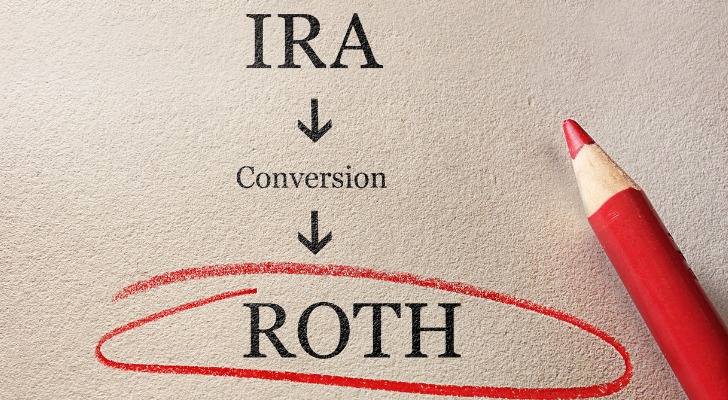
Which professional do I need for the tax calculation of a Roth conversion? A CFP, financial advisor or tax preparer? I’ve reached out to tax preparers before but they seemed to have no idea what I was talking about. My income right now is very low so I would like to take advantage of this opportunity. However, I found out last year that I need to do the transaction during the current calendar year, not at tax prep time, which makes things a little more complicated. Any info about how to approach the calculation will be a great help as well – Amir
Great question, and I wish there was a straightforward answer. Before we get started, I’ll confirm that you are thinking about this correctly. Low-income years are great opportunities to consider Roth conversions, and yes, you do need to actually perform the conversion before yearend, which necessitates estimating what your income will be before the year is over.
The short and simple answer is that you want a tax professional who provides such a service to help you with that. Practically speaking, that isn’t always so easy to identify. From the people on your list, any one of those could be the right person, but none of them necessarily are. I’ll explain why that is. (And if you need more help with important financial decisions in retirement, consider working with a financial advisor.)
Tax Professional
A tax professional is someone who is trained on and knowledgeable about the tax code, as other professionals are regarding their own crafts. There are certain credentials that signify levels of training and knowledge, although specific credentialing isn’t required to be a tax professional. A generic financial advisor is likely not a tax professional.
Tax Planning vs. Tax Preparation
Just knowing whether or not someone is a tax professional doesn’t tell you if they can help you estimate your income for Roth conversion purposes. It simply may not be a service they offer. As you’ve identified through your experiences, it may not even be one that they completely understand.
Here, I think it’s important to point out that there is often a big difference between tax preparation and tax planning. (A financial advisor can help you determine the relevant tax rates so you can make a wise decision on whether to do a Roth conversion.)
Tax Preparation

For most people, their tax professional is their tax preparer. That means that in the first few months of each year this person completes and files a tax return on your behalf based on information about the previous year. It’s “rearward” looking. In most cases tax advice given in conjunction with tax preparation relates to how you may be able to lower your current tax liability, but not in future years.
That is a valuable service, and one that must be done. It’s also one that most good tax preparers undercharge for, in my opinion.
Tax Planning
Tax planning, on the other hand, is forward looking. An advisor who does tax planning helps you optimize your taxes going forward. This is where estimating income before the end of the year so it’s actionable information for Roth conversion planning is important.
This is a different service than tax preparation. Your tax preparer may also offer tax planning, but not every tax preparer does. Likewise, tax planners don’t always prepare tax returns since, again, these are distinct services.
Professional Credentials Who Can Help
Certified Public Accountant (CPA)
It’s not on your list, but the CPA license is the most popular tax credential. Passing the CPA exam certainly demonstrates deep knowledge of taxes. However, there’s much more to the CPA curriculum, exam and being a CPA than just taxes. Many CPAs are involved in tax work, but many don’t practice taxes in any capacity and instead work in bookkeeping, auditing or other accounting functions.
Enrolled Agent (EA)
Enrolled agents must also demonstrate tax knowledge by completing a three-part exam administered by the IRS. EAs are often engaged in tax work for individuals, so this could be a good fit for your situation.
Certified Financial Planner (CFP)
The CFP credential is a broad personal financial planning credential that covers, among many other things, taxes. Although CFP holders often help clients with tax planning, it’s not inherently a tax credential, and most do not prepare tax returns. To know if a CFP offers this type of service, you’d need to ask them directly or check out their website. (And if you need help finding a financial advisor, try this matching tool.)
Bottom Line

I know that was a winding answer, but that is the reality. Although a CPA, EA or CFP could very well be someone to help you, they don’t all offer that type of service. Alternatively, there may be probably people out there well-suited to help you that don’t have any of those credentials. If you already work with a tax preparer I suggest asking them first.
Tips on Tax Planning
- If you don’t have a financial advisor who can help with your tax planning yet, finding one doesn’t have to be hard. SmartAsset’s free tool matches you with up to three vetted financial advisors who serve your area, and you can have free introductory calls with your advisor matches to decide which one you feel is right for you. If you’re ready to find an advisor who can help you achieve your financial goals, get started now.
- Check out SmartAsset’s income tax calculator for a quick estimate of what you’ll owe the federal government come tax time. Planning ahead for your taxes can help you optimize your plans to save you as much as possible.
Brandon Renfro, CFP®, is a SmartAsset financial planning columnist and answers reader questions on personal finance and tax topics. Got a question you’d like answered? Email AskAnAdvisor@smartasset.com and your question may be answered in a future column.
Please note that Brandon is not a participant in the SmartAdvisor Match platform, and he has been compensated for this article.
Photo credit: ©iStock.com/zimmytws, ©iStock.com/designer491